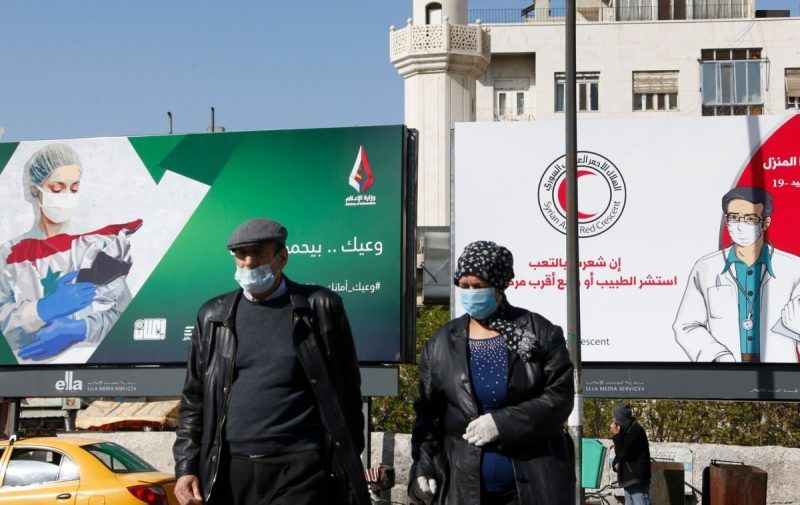
“You can’t expect your torturer to care about your health.” This simple truism was told to me by torture victim Omar Alshogre, who spent more than three years in the worst of the Bashar al-Assad regime’s dungeons, beginning when he was 15 years old. But if the tens of thousands of innocent civilians in Assad’s prisons catch the coronavirus, this contagious and potentially deadly disease will surely spread to their jailers. The only way the jailers can save themselves is by releasing their victims now.
As of Wednesday, the Syrian government had reported only 19 cases of the coronavirus in the entire country, including two deaths. Of course, that’s a shameless and dangerous lie. “It’s like North Korea,” a senior Trump administration official said. “We know it’s there. They know it’s there.” Put aside, for a moment, that the Assad regime continues to attack civilians in Idlib, where Syrian and Russian planes have been targeting hospitals. Hundreds of thousands more internally displaced Syrian civilians are cramped into camps, living in squalor.
The most vulnerable people in Syria and those suffering the most in that country — perhaps in the world — are those already rotting in Assad’s network of dungeons. For them, the coronavirus is the least of their worries. Men, women and children are packed into cells like animals, taken out only for their daily torture sessions. Alshogre watched as diseases such as tuberculosis (which he caught) spread at will. But most prisoners die at the hands of humans, not viruses.
In Branch 215 (known as the “Branch of Death”), and in the Saydnaya prison, characterized by Amnesty International as a “human slaughterhouse,” Alshogre saw prisoners being killed for simply revealing that they were sick. The torturers in these prisons have been committing atrocities for so long, they are not going to start caring about prisoners’ health just because of the coronavirus.
“The doctors themselves were killing prisoners. How can you expect doctors who are killing prisoners to now give them treatment?” Alshogre said. “But maybe they can understand, ‘We have to save the prisoners to save ourselves.’ ”
The first acknowledged coronavirus death in Syria was a woman from the town of Mneen. She was a shopkeeper in a local market that the guards surely visited, Alshogre said, a market that is down the street from the Saydnaya prison. It’s just a matter of time before the virus enters the prison, if it hasn’t already.
“You know how we got our food in Saydnaya? The guards would eat their food and throw their scraps at the prisoners,” Alshogre said. “Sometimes they spit or peed in the food and gave it to you after that.”
The guards must understand that they can’t protect themselves from the virus and torture the prisoners at the same time. They are all risking infection and death. There’s a huge transportation network that transfers prisoners within the system. That means if one prison has an outbreak, they all will.
Some of those prisons hold U.S. citizens, six of whom are thought to be in Assad’s hands right now. President Trump sent a personal letter to Assad last month asking him to release journalist Austin Tice. Assad has not responded.
The Syrian government is not going to release its prisoners or even protect its own personnel unless it faces more pressure to do so. The United Nations envoy for Syria, Geir Pedersen, called for Assad to release prisoners because of the coronavirus threat. But much more can and must be done.
In Washington, the Trump administration finalized implementation guidelines last week for new, powerful legislation that would authorize sanctions on the Assad regime, its industries, and its Russian and Iranian partners for their complicity in war crimes in Syria. The bill is named after Caesar, the pseudonym of a Syrian military defector who escaped with 55,000 photographs of the torture and killing of thousands of civilians in Assad’s custody.
The photos, which have been verified by the FBI and shown around the world, represent just a portion of what then-State Department War Crimes Ambassador Stephen Rapp called the worst “machinery of cruel death” since the Nazis.
“With this virus on the move, it’s easy to forget the ongoing tragedy in Syria. What’s worse is that this virus compounds on the already inhumane situation there,” Rep. Adam Kinzinger (R-Ill.) told me. “The Caesar Syria Civilian Protection Act is a strong hammer that needs to be enforced now.”
The world has stood by for years without bringing real pressure on Assad for these most horrendous of crimes against humanity. If there were ever a time to press that case, it is right now. And if Assad can’t be persuaded to free these poor souls, perhaps the people torturing them will realize that’s the only way they can survive.
Josh Rogin is a columnist for the Global Opinions section of The Washington Post. He writes about foreign policy and national security. Rogin is also a political analyst for CNN. He previously worked for Bloomberg View, the Daily Beast, Foreign Policy, Congressional Quarterly, Federal Computer Week and Japan's Asahi Shimbun newspaper.
